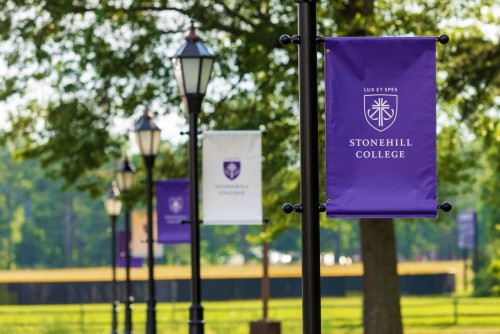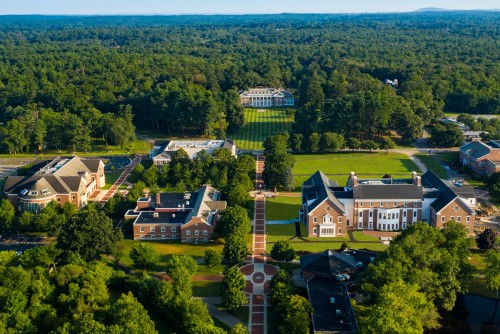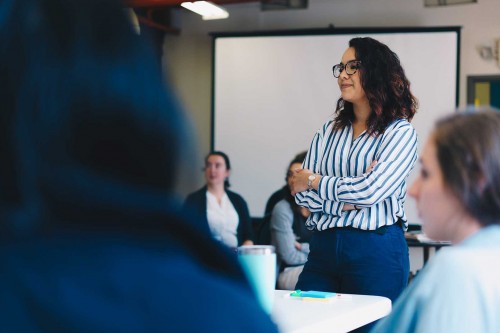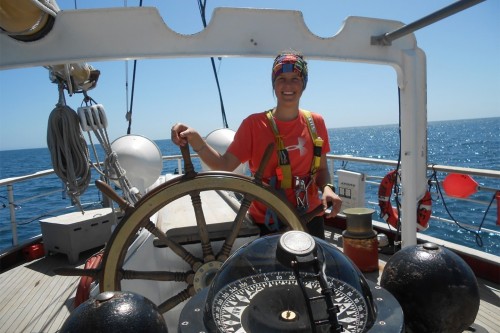Desire to Protect Inspires Environmental Majors
From policy development to scientific testing and research, Stonehill’s Environmental Sciences & Studies Department helps students find a way to make a difference.
Not surprisingly – given the headlines that dominate today’s news – there is no shortage of motivations for students considering Stonehill’s Department of Environmental Sciences & Studies.
“Students arrive at Stonehill knowing that the Colorado River Basin is drying up, that wildfires have been raging in the west and that record oceanic temperatures are being recorded in our ‘oceanic backyard,’ the Gulf of Maine,” says Professor Kristin Burkholder, chair of the department. “Many are motivated by wanting to help address some of the serious issues that we are facing as a society.”
The department’s structure gives them the opportunity to address those issues on two fronts. The bachelor of science in environmental science prepares them to work as environmental scientists through courses in natural science and mathematics, while the bachelor of arts in environmental studies emphasizes the non-science aspects of the environmental field, such as policy and sustainability efforts.
Regardless of which approach they take, Burkholder says graduates have a track record of launching successful careers in a wide range of fields.
Michelle Vuto ’13, for example, graduated from the environmental studies program and now works for the U.S. Environmental Protection Agency (EPA).
“Through my science courses, I developed strong analytical skills and comfort in writing scientific reports,” says Vuto, who works in Boston, assisting with the implementation of stormwater permits in New England. “The interdisciplinary approach of the program allowed me to explore different sides of environmental science and how they impact society, such as learning about the unfair inequalities in access to clean air and water.”
Liam Rendall ’18, who is also an environmental studies graduate, credits the mentoring of department faculty for providing him with a strong education.
“By allowing me the flexibility to find a passion within the environmental field, the department helped me gain a strong technical understanding of environmental regulations and principles as well as the challenges the environment is facing,” he says. Currently, Rendall is an environmental scientist at AECOM, where he provides environmental services to infrastructure and civil engineering projects.
Burkholder said that there are a number of key resources available to help students find a path that fits their interest. One of the most beneficial is personalized faculty advising. She says that faculty members all have active research agendas and welcome students into their labs. Students also benefit from the department’s collaboration with The Farm at Stonehill, where many of them volunteer.
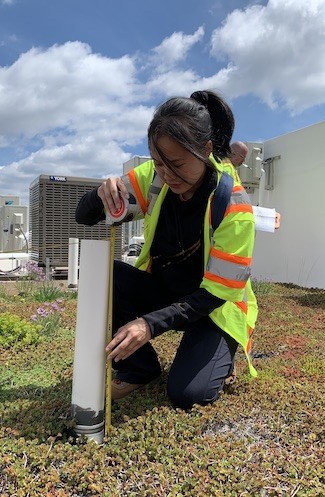
For Alexandra Vo ’20, who major in environmental science and later went on to earn an environmental engineering graduate degree, the course offerings and program structure at Stonehill were particularly important to her successful launch into the field.
“I believe that taking classes geared towards environmental sciences helped me acquire knowledge which I have found very useful as I have applied them to my current job,” said Vo, who works in Philadelphia as a water resource design engineer at private engineering consultant Johnson, Mirmiran & Thompson.
There, she designs underground storage basins that collect stormwater during rain events. Her day-to-day duties include using a computer-aided design application called AutoCAD, which essentially allows her to perform 2D and 3D modeling of the basins she designs. Vo says that her time as an environmental science major made a significant impact on her career.
“Taking engineering courses has helped my problem-solving skills, which really allows me to perform calculations needed to analyze pipe flow, basin capacity, etc. And on the other hand, taking environmental courses has helped me see the value of our world’s natural resources as well as understand how all water systems connect and relate to one another.”
Kristina McEvoy ’23
Kristina McEvoy ’23 said that as an aspiring conservation biologist, her Conservation Biology and Wildlife Conservation courses solidified her enthusiasm for conservation and that her passion for protecting wildlife allowed her to pursue unique opportunities. Her senior thesis – working with faculty and the New Hampshire Fish & Game Department – investigated moose-vehicle collisions in New Hampshire.
McEvoy, who also participated in the Stonehill Undergraduate Research Experience, says she feels ready to pursue her goal of a doctorate in conservation biology.
“As an environmental science major, I now possess all the tools to educate the community and lead the mission to conserve our planet.”
-
Request Information
Sign up now to be added to our mailing list, and we will show you how Stonehill could become part of your story.
-
Visit Opportunities
Our visit programs will help give you a better understanding of how Stonehill’s expansive leadership and experiential learning opportunities equip students for success in a rapidly evolving and globally competitive world.
-
Apply for Admission
Stonehill College provides an exceptional learning experience for both undergraduate and graduate students. We invite you to review the process, requirements and application deadlines for our entry options.
